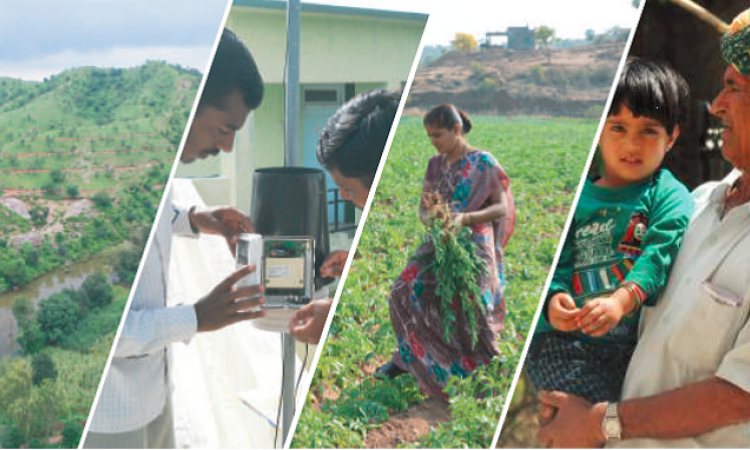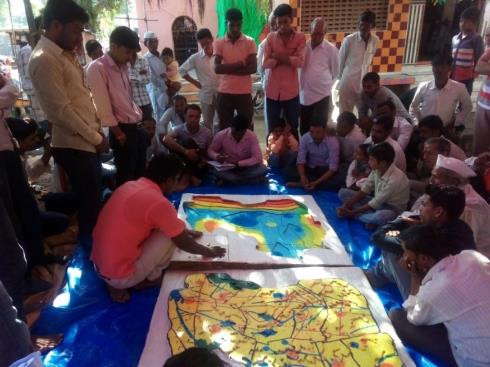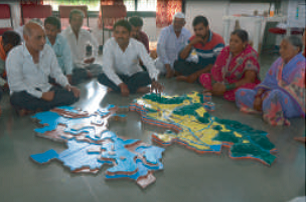
Sustainable development, still an unfinished agenda
In the fourth year into their implementation, the Sustainable Development Goals (SDGs) that aim at reducing developmental disparities in different parts of the world continue to be a cause for concern, with many international bodies urging for faster and effective action. There have been calls for better communication between research institutes and policy makers, increased responsibility by the private sector and more active participation from civil society to successfully implement the 2030 Agenda in developing countries such as India [1].
Source: www.un.org
The role of NGOs in improving SDG outcomes
While the core responsibility of meeting the development goals lies with national governments working with support (financial and building capacities) of international agencies, there is no doubt that increased engagement from industry leaders and civil society can make a huge difference. There are several reasons why NGOs as a part of the civil society can play an important role in influencing SDG outcomes. They provide, amongst others:
- A universal and integrated agenda
- An advocacy tool
- An opportunity to create new coalitions
- A window of opportunity to influence national political strategy
- An opportunity for new funding sources [3]
The scope to influence sustainability at the regional, national or international level lies in the shared agenda of all the stakeholders concerned, regardless of the point of entry or scale of operations [2]. While the activities of most NGOs contribute to SDG outcomes, very few have attempted to map their activities and identify pathways through which their activities have resulted in improvements in the broader SDG outcomes [3]. Few pioneers in this effort have been WWF, with interesting infographics to show connects to SDGs, and World Vision, which goes into more details of identifying specific SDG targets that it contributes to [4].
Mapping pathways to sustainability: WOTR’s experience

The Watershed Organisation Trust (WOTR) has been evolving a knowledge-informed, multidisciplinary and participatory approach to sustainability and resilience building over the past decade. This approach had its roots in the inclusive and community-led watershed development strategies adopted by WOTR during the 1990s and early 2000s that resulted in significant policy influence to national watershed development guidelines and the programmes initiated by key agencies like NABARD and Ministry of Rural Development in India [5].
These interventions in watershed development also influenced other developmental outcomes in places where they were implemented such as improvement in agricultural outputs, elevation in status of women, better health outcomes and sustainable economic development through community participation in villages.
In the recently published 2017-18 annual report, we are happy to note that our works directly contribute to nine of the 17 SDG goals (UN 2030 Agenda for Sustainable Development) and are aligned with other key international conventions—Land Degradation Neutrality, the Paris Agreement on Climate Change and the Sendai Framework on Disaster Risk Reduction [6].
Fig 1: Inter-linkages between WOTR’s thematic areas of work and the SDGs they relate to
WOTR recognises that all the above international frameworks are intrinsically linked and that action in one area benefits the other. Linking them to SDG targets can greatly help in developing an integrated approach to achieve the ‘future we want’ and ‘leave no one behind’ that national development priorities, as well as international frameworks, emphasise.

Tracing pathways to sustainability: Challenges faced
The maze of 17 SDGs, 169 targets and 232 indicators can be intimidating, especially to smaller organisations with a limited capacity to dedicate resources for this type of reporting. And this was without a doubt what made us at WOTR also hesitant to embark on this effort.
What we realised, however, was that taking a holistic approach to development and working on inter-and multi-disciplinary approaches, is something that is part of WOTR’s DNA (for example of multi-disciplinary and inclusive ways used by WOTR, see 1) WOTR’s Wasundhara Approach [7] and 2) CoDriVE – PD tool for vulnerability assessment) [8]. We have always believed in the principles of “learning-by-doing”, “reflection” and “systems-based approach”.
These principles towards poverty alleviation in semi-arid parts of India has led WOTR to develop expertise across a wide range of activities that impact all five capitals critical for sustainable development–natural, physical, financial, human and social [9]. This holistic approach, we realised, was central to the SDGs too, whose benefits lie in their capacity to integrate environmental, social and development challenges [10].
Fig 2: The 5-capital framework used by WOTR towards achieving adaptive sustainable development viii
Taking a multi-disciplinary approach is not necessarily built into many of the individual projects that NGOs might be involved in. The challenges that the NGOs can then face are finding out ways of measuring the impacts that the projects have had on other indicators of development beyond those defined in the projects. WOTR’s attempt to map all thematic areas of work against relevant SDGs in its 2017-18 Annual Report [6] too has had its share of challenges. We have attempted to highlight a few points below that can be a useful checklist for NGOs who would like to map the impacts of their activities on broader development goals. These include:
- Baseline data: Project budgets often specify separate allocation for documentation of ‘work-done’ with impacts and not necessarily measuring allied or knock-on outcomes. For instance, a watershed project might measure the extent of soil and water conservation work done in hectares, but due to lack of reliable baseline data, it might be hard to measure its knock-on outcomes on other allied livelihoods.
- Disaggregated data: Often, generic system for data collection prescribed by large programmes or limited budgets for monitoring and evaluation work might mean there is a lack of gender and age-disaggregated data or lack of details on poorer or more vulnerable sections of society. So, measuring the efficacy of programmes in targeting the most vulnerable is difficult unless NGOs are devoting own funds or resources towards these.
- Differences between national and international indicators: In India, the NITI Aayog is responsible for tracking progress towards the SDGs of states and union territories [11]. It has come up with its own composite indicator–the SDG India Index [12]–to simplify the tracking. However, four important goals, including SDG 13 on climate change is not covered by this index.
- Capacity constraints: There are a number of targets towards which smaller NGOs might not have the capacity to dedicate resources for tracking. For example, contribution to reducing greenhouse gases would require using a complex set of calculations that are often carried out by very expensive international consulting companies only.
- Cultural or locale-specific challenges: Other challenges that vary from region to region like those related to the rights of minorities and vulnerable sections of society, or transparent and accurate disclosure of household income/expenditure levels. There are ways in which larger government surveys may be able to triangulate data collection methods to verify data, but these could be quite daunting for smaller organisations.
The next stage of sustainability reporting for WOTR
WOTR is today amongst a small, select group of large national/international NGOs that have publicly mapped its actions against SDG outcomes. WOTR would like to take this structure of reporting, aligned with the SDGs, a step forward in the coming year and quantitatively measure its work against the relevant SDG targets and indicators. Such an integrated approach would enable WOTR to continue impacting both sustainable development as well as building resilience to climate change at scale by creating synergies with related national and international policy frameworks.
We believe that such efforts will help integrate impacts of various non-state actors to India’s SDG targets–corporates, NGOs, research institutes and other stakeholders (for example of WOTR’s efforts in multi-institutional collaboration, see the article on Integrated Agro-meteorological Services) [13]. WOTR also intends to use the insights gained in capacity building for other civil society organisations and CSRs in such sustainability reporting.
Regardless of the point of entry or scale of operations, efforts of all stakeholders concerned are, without doubt, essential for our sustainable future.
Fig 3: Mapping of WOTR’s thematic areas with SDGs
References
- Editorial (2018) Tracking progress on the SDGs, Nature Sustainability, 1 (377)
- Bain and Company (2019) India Philanthropy Report: Embracing the field approach to achieve India's Sustainable Development Goals
- Hege and Demailly (Date not specified) How do NGOs mobilize around the SDGs and what are the ways forward? IDDRI Working paper
- Long (Date not specified) How should civil society stakeholders report their contribution to the implementation of the 2030 Agenda for Sustainable Development? Technical Paper for the Division for Sustainable Development, UN DESA.
- Gray and Srinidhi (2o13) Watershed Development in India: Economic Evaluation and Adaptation Considerations, World Resources Institute Working Paper.
- Watershed Organisation Trust (2017-2018) Annual Report 2017-18
- Jewler (Date not specified) The Wasundhara Approach
- Watershed Organisation Trust (2013) Community-Driven Vulnerability Evaluation Tool “CoDriVE-Programme Designer” . A Handbook – Incorporating Vulnerability to Climate Change into Project Design and ImplementationCommunity Driven Vulnerability Evaluation
- Water Shed Organisation Trust (2019) Engine for Adaptive Sustainable Development. Accessed on 17th June 2019
- Watershed Organisation Trust (2010) Comprehensive environmental management through holistic development
- SDG India Dashboard: https://sdgindiaindex.socialcops.com/YuJbcq9d44/state-ut-ranking/basic#3/23.00/81.26
- NITI Aayog (2018) SDG India Index - Baseline Report 2018: https://niti.gov.in/content/sdg-india-index-baseline-report-2018
- Lobo, Chattopadhyay, Rao (2017) Making smallholder farming climate smart: Integrated Agrometeorological Services, Economic and Political Weekly, LII (1)
A copy of WOTR's Annual Report 2017-18 can be accessed at this link
Arjuna Srinidhi, is a Senior Researcher, WOTR Centre for Resilience Studies (W-CReS)
Marcella D’Souza is the Director, WOTR Centre for Resilience Studies (W-CReS)
Crispino Lobo is the Co-founder and Managing Trustee, Watershed Organisation Trust (WOTR)
/articles/water-agriculture-well-being-and-beyond